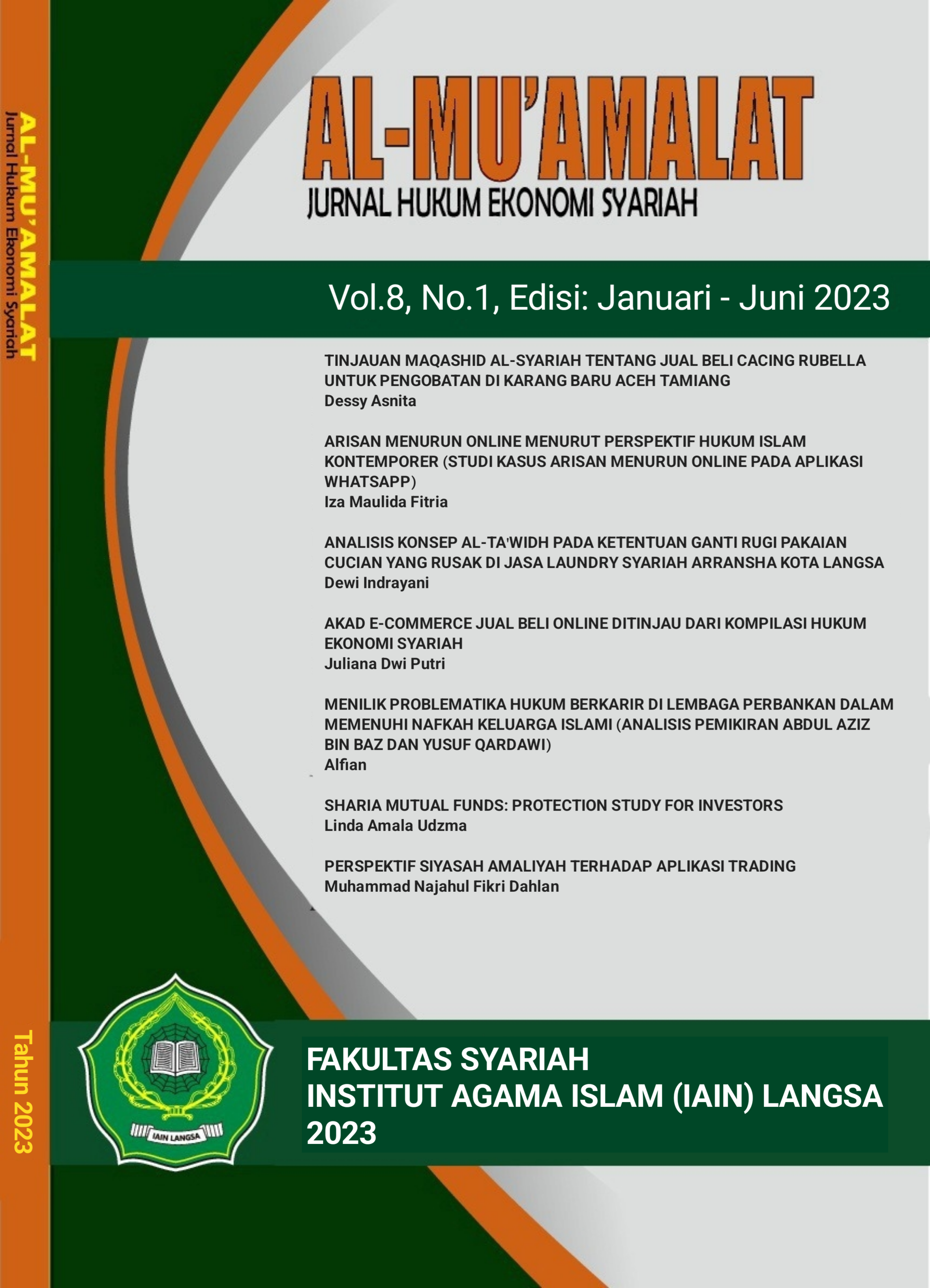Main Article Content
Abstract
The problem discussed in this article is how the review of the types of online buying and selling transactions in e-commerce in Indonesia is reviewed from the compilation of sharia economic law. The expected beneï¬ts of this research include eliminating doubts in choosing the type of online buying and selling transactions in e-commerce in Indonesia and knowing the types of online buying and selling transactions (peer to peer) in e-commerce in Indonesia that are in accordance with Islamic law. This research uses a qualitative research approach, where this scientiï¬c method is used to build knowledge through understanding and discovery. The results of this study indicate that in conducting E-commerce transactions, there are two sales and purchase contracts that can be used, namely the salam and Istisna contracts. If the salam contract, the buyer makes a payment in advance and the product speciï¬cations are clearly stated and the delivery of the goods is delayed, while the Istishna contract, the speciï¬cations of the goods have been agreed upon by the buyer and seller then an order is made in advance or the goods have not / are being made.
Keywords
Article Details
References
- Dhinarti, L., & Amalia, F. (2019). E-Commerce dalam Perspektif Fiqh Muamalat. Proceeding of Conference on Islamic Management, Accounting, and Economics (CIMAE),2, 162–169.
- Fadhli, A. (2016). Tinjauan Hukum Islam Terhadap Penerapan Akad As-Salam dalam Transaksi E-Commerce.Mazahib,15(1), 1–19. https://doi.org/10.21093/mj.v15i1.589
- Hidayah, A. (2008). Akad Perdagangan Electronic Commerce Ditinjau Dari Kompilasi Hukum Ekonomi Syariah.Jurnal Ekonomi Syariah,4(1),226–232.
- Iii, B. A. B., Transaksi, A., Terdapat, E. Y ., & Akad, I. (n.d.). Bab iii akad transaksi e-commerce yang terdapat dalam jual beli online. 59–66.
- Naafs, S., & White, B. (2012). Generasi Antara : Refleksi tentang Studi Pemuda Indonesia. Jurnal Studi Pemuda, I(2), 89–106. https://journal.ugm.ac.id/jurnalpemuda/article/viewFile/32063/19387
- Pekerti, R. D., & Herwiyanti, E. (2018). Transaksi Jual Beli Online dalam Perspektif Sariat Madzhab Asy-Syafi’i. JEBA: JurnalEkonomi,Bisnis,DanAkuntansi,20(2),1–12. https://core.ac.uk/display/267947229?utm_source=pdf&utm_medium=banner&utm_cam paign=pdf-decoration-v1
- Rahayu, A. K. S. (2020). Penerapan Jual Beli Akad Salam Dalam Layanan Shopee. Ar-Ribhu,3(2), 92–106. Rachmawati, E. N., & Mumin, A. (2015). Praktiknya Di Pasar Modal Indonesia. Akad Jual Beli Dalam Perspektif Fikih Dan Praktiknya Di Pasar Modal Indonesia, 12(4), 785–806.
- Siregar;, R. A. S., Qadrya, H. A., Caroline, B. M., Sari, A.P.,Lazuardi,L.I.,&Arbi,R. (2017). Analisis transaksi jual-beli online (peer to peer) pada e-commerce berdasarkan hukum syariah.Jurnal of Islamic Economics Lariba,3(1), 31–38.
- Saprida, S. (2018). Saprida, S. (2018). Akad Salam Dalam Transaksi Jual Beli. Mizan: Journal of Islamic Law, 4(1), 121–130. https://doi.org/10.32507/mizan.v4i1.177Akad Salam Dalam Transaksi Jual Beli. Mizan: Journal ofIslamic Law,4(1), 121–130.
- Sukmayanti, A. (2020). Tinjauan Ekonomi Islam Terhadap Akad Pada E-Commerce Study Kasus Tokopedia. Ar-Ribhu, 3(2), 107–119. https://ojs.diniyah.ac.id/index.php/Ar-Ribhu
- Taufiq, S. (2017). Pelaksanaan JualBeliMelaluiOnlineShopDalamPerspektifEkonomi Syariah.Febi.Iainlhokseumawe.Ac.Id.
